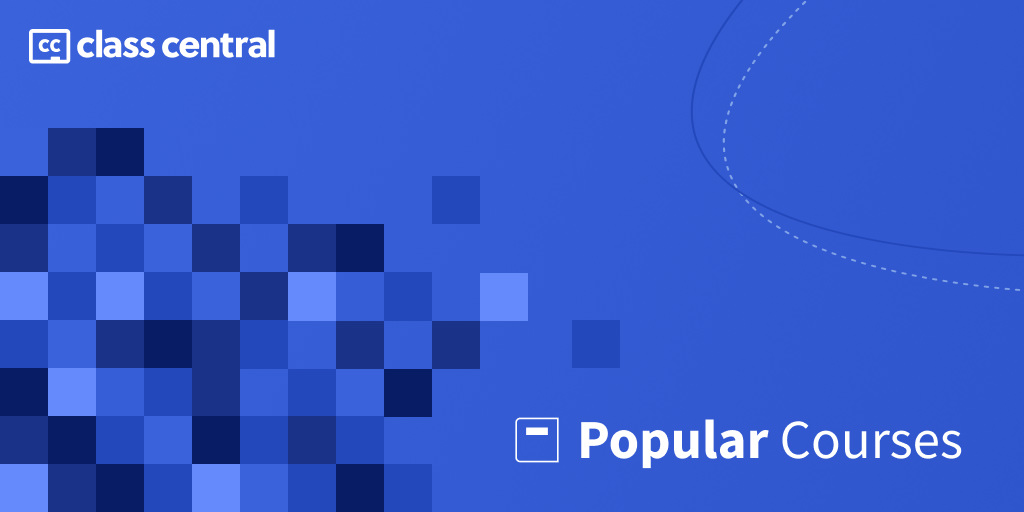25 Most Popular Online Courses Starting in May 2022
The 25 most popular free online university courses and MOOCS starting in May 2022.
Here are the 25 most popular free online university courses and Massive Open Online Courses (MOOCs) starting in May 2022, based on Class Central learners’ activity.
If you don’t find what you’re after here, either browse Class Central’s extensive catalog of over 70,000 online courses via our subjects page, or have a look at our thematic collections:
- Massive List of Thousands of Free Certificates and Badges
- 1600+ Coursera Courses That Are Still Completely Free
- 450+ Free Ivy League Online Courses
- The Best Online Courses of All Time
- 100 Top FREE edX Courses of All Time
- 250 Top Udemy Courses of All Time
Most Popular Courses
How to Create a Good Business
University of Michigan via Coursera
In this course, you’ll unpack what “worker wellbeing” means across different contexts, explore how to use research techniques to find the sweet spot between worker interests and firm interests, and understand how to design scalable solutions to enable both parties to thrive.
Relational Database Design
University of Colorado Boulder via Coursera
Have you ever wanted to build a database but don’t know where to start? This course will provide you a step-by-step guidance. We are going to start from a raw idea to an implementable relational database. Getting on the path, practicing the real-life mini cases, you will be confident and comfortable with Relational Database Design. Let’s get started!
Python and Pandas for Data Engineering
Duke University via Coursera
In this first course of the Python, Bash and SQL Essentials for Data Engineering Specialization, you will learn how to set up a version-controlled Python working environment which can utilize third party libraries. You will learn to use Python and the powerful Pandas library for data analysis and manipulation. Additionally, you will also be introduced to Vim and Visual Studio Code, two popular tools for writing software.
IoT : communications and networks
Institut Mines-Télécom via Coursera
The IoT world represents billions of sophisticated objects such as sensors, actuators and meters that are deployed nearly everywhere, in homes, hospitals, factories, cities, and connected to the Internet. But with limited capacity in terms of memory storage, computational power and energy, how can these objects assure network reliability and timely transmission ? That is what you’ll learn in this course.
Renewable Energy Projects
University of Colorado Boulder via Coursera
This course will teach you to plan, execute, and operate renewable energy projects such as solar PV plants, wind farms, and geothermal generators.
Communicating Trustworthy Information in the Digital World
Erasmus University Rotterdam via Coursera
This course consists of seven modules focused on how to more effectively communicate trustworthy information in the digital world.
Algebra and Differential Calculus for Data Science
University of Colorado Boulder via Coursera
Are you interested in Data Science but lack the math background for it? Has math always been a tough subject that you tend to avoid? This course will teach you the most fundamental Calculus concepts that you will need for a career in Data Science without a ton of unnecessary proofs and techniques that you may never use.
Customer Centric Innovation
University of Illinois at Urbana-Champaign via Coursera
Successful innovation starts with understanding customer needs and ends with a delighted customer. This course is created to develop a holistic understanding of customers’ role in developing successful innovations and how to capture and utilize customer information to create successful innovations.
Essential Linear Algebra for Data Science
University of Colorado Boulder via Coursera
Consider this an expressway to Data Science with approachable methods and friendly concepts that will guide you to truly understanding the most important ideas in Linear Algebra.
Application Security and Monitoring
IBM via Coursera
This course describes security best practices that developers follow when developing applications. It also teaches you how to effectively monitor and troubleshoot applications using related tools. You will complete a final project in which you will deploy and update an application you have created using your newly acquired monitoring skills.
Fundamentals of Diversity
IE Business School via Coursera
The course will provide you with the basic tools to be able to navigate diversity. The course will bring you an understanding of the fundamental categories of diversity, and will particularly focus on demographic diversity including gender, ethnicity, race, disability, aging or physical appearance.
Measurement Systems Analysis
University of Colorado Boulder via Coursera
In this course, you will learn to analyze measurement systems for process stability and capability and why having a stable measurement process is imperative prior to performing any statistical analysis. You will analyze continuous measurement systems and statistically characterize both accuracy and precision using R software. And you will perform measurement systems analysis for potential, short term and long term statistical control and capability.
Machine Teaching for Autonomous AI
University of Washington via Coursera
In this course, you’ll learn how automated systems make decisions and how to approach building an AI system that will outperform current capabilities. Since 87% of machine learning systems fail in the proof-concept phase, it’s important you understand how to analyze an existing system and determine whether it’d be a good fit for machine teaching approaches.
Attitude Control with Momentum Exchange Devices
University of Colorado Boulder via Coursera
This first course focuses on nonlinear attitude feedback control using a range of angular momentum devices. The course provides a comprehensive review of prerequisite material. Next it develops equations of motion of a spacecraft with momentum exchange devices such as reaction wheels (RWs), control momentum gyroscopes (CMGs) and variable speed control moment gyroscopes (VSCMGs).
Machine Learning: an overview
Politecnico di Milano via Coursera
The course provides a general overview of the main methods in the machine learning field. Starting from a taxonomy of the different problems that can be solved through machine learning techniques, the course briefly presents some algorithmic solutions, highlighting when they can be successful, but also their limitations. These concepts will be explained through examples and case studies.
Linux and Bash for Data Engineering
Duke University via Coursera
In this course, you will learn the fundamentals of Linux necessary to perform data engineering tasks. Additionally, you will explore how to use both Bash and zsh configurations, and develop the syntax needed to interact and control Linux. These skills will allow you to manage and manipulate databases in a Bash environment.
Key Concepts in Organizational DE&I
Rice University via Coursera
Key Concepts in Organizational DE&I explores the foundational principles of DE&I and how they often impact decision-making within organizations. While these concepts are common, this course presents them through the unique lens of an equal opportunity professional with experience resolving complaints of discrimination and delivering DE&I programming to influence organizational culture and policy.
Façade design and engineering: complexity made simple
Delft University of Technology via edX
Understand the fundamental technology behind façade design and construction and the impact of the various components in facilitating the construction of sustainable, energy efficient, aesthetic and modern buildings.
Platform Thinking: designing a Platform
Politecnico di Milano via Coursera
Platforms changed the way we live and we do business. This module of the “Platform Thinking” series aims to help innovators in designing and building platforms. At first sight, it may seem that platforms “simply” connect different kinds of users, as Airbnb links travelers and hosts or as Uber links drivers and riders. Well, this is true: platforms link different kinds of users. Nevertheless, this is just the enabling factor to have a platform, definitely not enough to describe the wide range of activities they actually do.
Why Smart Executives Fail: Common Mistakes & Warning Signs
Dartmouth College via Coursera
We don’t often talk about mistakes and failures, but there’s so much to learn from what goes wrong. In this course, Professor Sydney Finkelstein will teach you why leaders make mistakes, and what you can do to avoid making those same mistakes yourself. Using real-life examples of smart executives who failed, Professor Finkelstein will walk you through scenarios that prepare you to understand, manage, and even take advantage of the continuous change that is inevitable in organizations and in life.
Computing for Cancer Informatics
Johns Hopkins University via Coursera
One of the key cancer informatics challenges is dealing with and managing the explosion of large data from multiple sources that are often too large to work with on typical personal computers. This course is designed to help researchers and investigators to understand the basics of computing and to familiarize them with various computing options to ultimately help guide their decisions on the topic.
Managing Innovation: Ambidexterity, Teams and Leading Change
University of Illinois at Urbana-Champaign via Coursera
This course helps you develop a perspective on managing innovation. That is, you will build your capability to lead and design your organization to effectively implement innovation initiatives and achieve their strategic intent.
Being Smart about Cycling Futures
University of Amsterdam via Coursera
Instead, this course helps you to develop your own approach to cycling futures and innovation. It teaches you to ask critical questions about various aspects of cycling practice and its place in mobility systems, about cycling innovation and the way in which various stakeholders imagine cycling futures.
Introduction to Translational Science
University of Michigan via Coursera
Translational science is the process of turning observations in the laboratory, clinic, and community into interventions that improve the health of individuals and populations. In this course, you’ll learn about the role of translational research in moving scientific discoveries into applications for improving human health.
AI, Empathy & Ethics
University of California, Santa Cruz via Coursera
This nontechnical course provides an overview of artificial intelligence advancements and the ethical challenges we now face as we navigate the development, implementation, and ubiquitous global use of AI.







